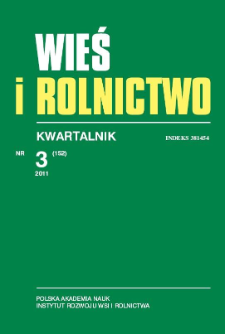- Search in all Repository
- Literature and maps
- Archeology
- Mills database
- Natural sciences
Advanced search
Advanced search
Advanced search
Advanced search
Advanced search

Object
Title: The role of institutions in the process of promoting and developing business activity in rural areas
Publisher:
Instytut Rozwoju Wsi i Rolnictwa Polskiej Akademii Nauk
Place of publishing:
Type of object:
Abstract:
The article analyzes the role of institutions in the development of business activity in rural areas and in assistance available to rural enterprises. It also defines the most significant institutional conditions that contribute to or hamper the establishment and development of enterprises in rural areas. Basing on the results of her own investigations, the author of the article claims that it is necessary to introduce an innovative, comprehensive network of support for enterprises, which would cover the stage of creation of a concept for a business and the shaping of crucial business competencies, financial aid and advisory guidance for the already operating rural firms. The author suggests that for the purpose of implementing such a system it would be advisable to use the National Rural Areas' Network (KSOW).
References:
Doing Business 2011, 2011. Raport Banku Światowego, Washington D.C.
Drucker P.F., 2002: Discipline of Innovation. „Harvard Business Review”, August.
Economic Freedom of the World, 2010. Annual Report. J.G. Gwartney, J.C. Hall, R. Lawson, Economic Freedom Network (www.freetheworld.om).
Entreprenurship Survey of the EU25. Secondary analysis. Poland (http://ec.europa.eu/enterprise/policies/sme/files/survey/static2008/poland_static_en.pdf).
Fukuyama F., 2003: Kapitał społeczny. W: Kultura ma znaczenie. Red. L.E. Harrison, S.P. Huntington. Zysk i S-ka, Kraków.
Gorynia M., 1999: Przedsiębiorstwo w nowej ekonomii instytucjonalnej. „Ekonomista” 6, Miscellanea.
Kent C.A., 1991: Rola przedsiębiorcy w gospodarce. W: D.R. Kamerschen, R.B. McKenzie, C. Nardinelli: Ekonomia. Fundacja Gospodarcza NSZZ Solidarność, Gdańsk.
Models to Reduce the Disproportionate Regulatory Burden on SMEs, 2007. Report of the Expert Group. Komisja Europejska, Executive Report, maj.
North D.C., 1997: Institutions, Institutional Change and Economic Performance. Cambridge University Press, New York.
Nurzyńska I., 2011: Fundusze Unii Europejskiej a system finansowania inwestycji ze środków publicznych w Polsce. IRWiR PAN, Warszawa.
Ośrodki innowacji i przedsiębiorczości w Polsce, 2010. Raport PARP, Warszawa.
Przedsiębiorczość w Polsce, 2010: Raport Ministerstwa Gospodarki, Warszawa.
Putnam R.D., 2008: Samotna gra w kręgle. Upadek i odrodzenie wspólnot lokalnych w Stanach Zjednoczonych. Wydawnictwa Akademickie i Profesjonalne, Warszawa.
Samuelson P., Nordhaus W.D., 1989: Economics. McGraw-Hill Book Company, New York.
Schumpeter J.A., 1995: Kapitalizm, socjalizm, demokracja. Wydawnictwo Naukowe PWN, Warszawa.
Sierocińska K.: Kapitał społeczny. Definiowanie, pomiar i typy (http://www.inepan.waw.pl/pliki/studia_ekonomiczne/Studia%202011%201%204%20sierocinska.pdf).
Strategia lizbońska, 2000 (http://www.euractiv.com/en/future-eu/lisbon-agenda/article-117510).
Szczepaniec M., 2007: Wielkość firmy a wzorce korzystania z usług bankowych. Bank i Kredyt, lipiec (http://www.bankikredyt.nbp.pl/content/2007/2007_07/szczepaniec.pdf).
The Global Competitiveness Report 2009–2010, 2011. WEF, styczeń. Theory and Evidence, 2006. Volume I. The SME Financing Gap, OECD.
Understanding and Measuring Social Capital: a Multidisciplinary Tool for Practitioners. T I., 2002. World Bank.
Valdez J.: The entrepreneurial ecosystem: toward a theory of new business formation (http://www.sbaer.uca.edu/research/sbida/1988/PDF/11.pdf).
Warunki powstawania i działania oraz perspektywy rozwojowe polskich przedsiębiorstw powstałych w latach 2005–2009, 2011. GUS, Warszawa.
Wilkin J., 2005: Teoria wyboru publicznego – homo oeconomicus w sferze polityki. W: Teoria wyboru publicznego. Wstęp do ekonomicznej analizy i funkcjonowania sfery publicznej. Red. J. Wilkin. Wydawnictwo Naukowe Scholar, Warszawa.
Relation:
Issue:
Start page:
End page:
Resource Identifier:
oai:rcin.org.pl:242087 ; doi:10.53098/wir.2011.3.152/06 ; 0137-1673 (print); 2657-5213 (on-line)
Source:
Language:
Language of abstract:
Rights:
Creative Commons Attribution BY 4.0 license
Terms of use:
Digitizing institution:
Institute of Rural and Agricultural Development of the Polish Academy of Sciences
Original in:
Library of the Institute of Rural and Agriculture Development of the PAS
Projects co-financed by:
Access:
Object collections:
- Digital Repository of Scientific Institutes > Literature > Journals/Articles
- Digital Repository of Scientific Institutes > Partners' collections > Institute of Rural and Agricultural Development PAS > Library collections
Last modified:
Mar 18, 2025
In our library since:
Aug 7, 2024
Number of object content downloads / hits:
1
All available object's versions:
https://rcin.org.pl./publication/278468
Show description in RDF format:
Show description in RDFa format:
Show description in OAI-PMH format:
| Edition name | Date |
|---|---|
| Rola instytucji w procesie promowania i rozwoju przedsiębiorczości na terenach wiejskich | Mar 18, 2025 |
Objects Similar
Nurzyńska, Iwona
Nurzyńska, Iwona
Nurzyńska, Iwona Rosa, Anna
Nurzyńska, Iwona Drygas, Mirosław
Banecki, Janusz Nurzyńska, Iwona Wiatrak, Tomasz

 INSTYTUT ARCHEOLOGII I ETNOLOGII POLSKIEJ AKADEMII NAUK
INSTYTUT ARCHEOLOGII I ETNOLOGII POLSKIEJ AKADEMII NAUK
 INSTYTUT BADAŃ LITERACKICH POLSKIEJ AKADEMII NAUK
INSTYTUT BADAŃ LITERACKICH POLSKIEJ AKADEMII NAUK
 INSTYTUT BADAWCZY LEŚNICTWA
INSTYTUT BADAWCZY LEŚNICTWA
 INSTYTUT BIOLOGII DOŚWIADCZALNEJ IM. MARCELEGO NENCKIEGO POLSKIEJ AKADEMII NAUK
INSTYTUT BIOLOGII DOŚWIADCZALNEJ IM. MARCELEGO NENCKIEGO POLSKIEJ AKADEMII NAUK
 INSTYTUT BIOLOGII SSAKÓW POLSKIEJ AKADEMII NAUK
INSTYTUT BIOLOGII SSAKÓW POLSKIEJ AKADEMII NAUK
 INSTYTUT CHEMII FIZYCZNEJ PAN
INSTYTUT CHEMII FIZYCZNEJ PAN
 INSTYTUT CHEMII ORGANICZNEJ PAN
INSTYTUT CHEMII ORGANICZNEJ PAN
 INSTYTUT FILOZOFII I SOCJOLOGII PAN
INSTYTUT FILOZOFII I SOCJOLOGII PAN
 INSTYTUT GEOGRAFII I PRZESTRZENNEGO ZAGOSPODAROWANIA PAN
INSTYTUT GEOGRAFII I PRZESTRZENNEGO ZAGOSPODAROWANIA PAN
 INSTYTUT HISTORII im. TADEUSZA MANTEUFFLA POLSKIEJ AKADEMII NAUK
INSTYTUT HISTORII im. TADEUSZA MANTEUFFLA POLSKIEJ AKADEMII NAUK
 INSTYTUT JĘZYKA POLSKIEGO POLSKIEJ AKADEMII NAUK
INSTYTUT JĘZYKA POLSKIEGO POLSKIEJ AKADEMII NAUK
 INSTYTUT MATEMATYCZNY PAN
INSTYTUT MATEMATYCZNY PAN
 INSTYTUT MEDYCYNY DOŚWIADCZALNEJ I KLINICZNEJ IM.MIROSŁAWA MOSSAKOWSKIEGO POLSKIEJ AKADEMII NAUK
INSTYTUT MEDYCYNY DOŚWIADCZALNEJ I KLINICZNEJ IM.MIROSŁAWA MOSSAKOWSKIEGO POLSKIEJ AKADEMII NAUK
 INSTYTUT PODSTAWOWYCH PROBLEMÓW TECHNIKI PAN
INSTYTUT PODSTAWOWYCH PROBLEMÓW TECHNIKI PAN
 INSTYTUT SLAWISTYKI PAN
INSTYTUT SLAWISTYKI PAN
 SIEĆ BADAWCZA ŁUKASIEWICZ - INSTYTUT TECHNOLOGII MATERIAŁÓW ELEKTRONICZNYCH
SIEĆ BADAWCZA ŁUKASIEWICZ - INSTYTUT TECHNOLOGII MATERIAŁÓW ELEKTRONICZNYCH
 MUZEUM I INSTYTUT ZOOLOGII POLSKIEJ AKADEMII NAUK
MUZEUM I INSTYTUT ZOOLOGII POLSKIEJ AKADEMII NAUK
 INSTYTUT BADAŃ SYSTEMOWYCH PAN
INSTYTUT BADAŃ SYSTEMOWYCH PAN
 INSTYTUT BOTANIKI IM. WŁADYSŁAWA SZAFERA POLSKIEJ AKADEMII NAUK
INSTYTUT BOTANIKI IM. WŁADYSŁAWA SZAFERA POLSKIEJ AKADEMII NAUK




































